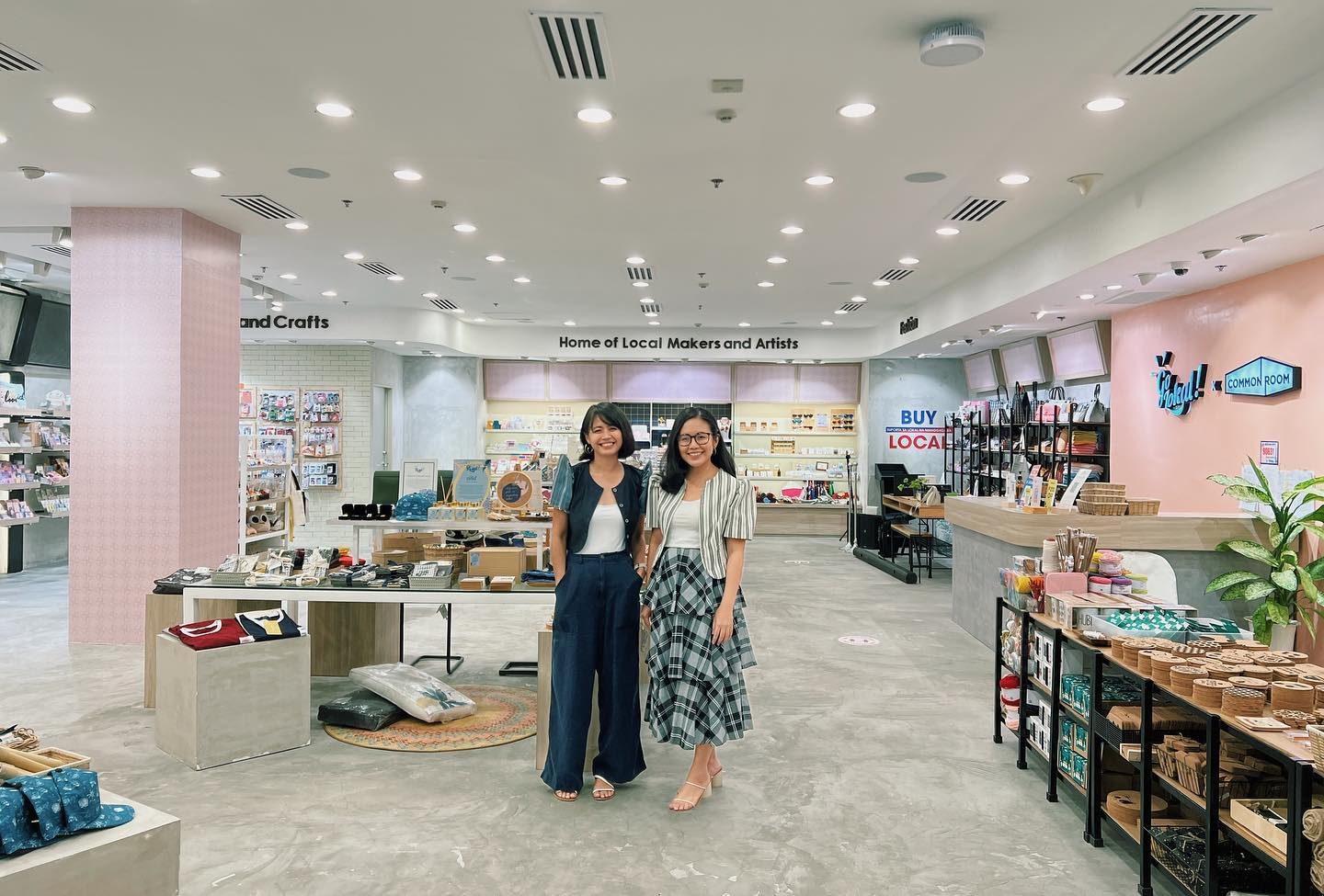SUMMARY
This is AI generated summarization, which may have errors. For context, always refer to the full article.

MANILA, Philippines – The beloved crafts store Common Room PH finally made its return to Katipunan Avenue in Quezon City, two years after the closure of its first Katipunan store back in July 2020.
The new branch, in collaboration with the Department of Trade and Industry’s Go Lokal! Program, is located at UP Town Center.
Common Room’s first branch was located along Dela Rosa Street, and served as a creative hub for students and residents in the area. Its comeback to Katipunan means its loyal QC community can once again flock to its aisles of handmade goods and local crafts without having to travel too far.
“We’re so happy it’s actually doing good. It’s one of our best-selling stores at the moment, maybe because it’s new also,” Roma Agsunod told Rappler. “It really feels good to be back.”
“When the Katipunan shop closed, it was heartbreaking for us because it was our first home,” Maan Agsalud shared. “We have a very loyal community in Katipunan, so we really wanted to keep it as long as we can. But during the pandemic, it was just really hard to keep everything open.”
Common Room PH is an arts and crafts store of around 200 local makers and artists launched in 2015 by founder-owners Agsunod and Agsalud. The pair also created craft shop POPJUNKLOVE where they sell handmade dolls and trinkets.
After almost a decade of running the latter business, they decided to create a shared space to empower other local makers to grow their own. Thus, Common Room PH was born.
As businesses were impacted by the pandemic, Common Room struggled to make up for the lack of foot traffic to its branches as lockdown measures restricted movement in public spaces.
“The main concern was that our specialty was experiential. You go to the store, you experience the community, you experience the installations, you experience the handmade goods,” Agsunod shared.
“So when the pandemic hit, we realized that we had no income coming in because all of our sources of income were really dependent on the stores. That’s when we knew that the business model had a weakness.”
Another major concern was the tenure of partners and staff. No team members were laid off and rent was not imposed on partner makers and artists.
“I think that also explains why in 2021, we almost closed because we were assisting our community. Those were company measures that we really couldn’t afford, but we still continued to do,” Agsunod added.
As business picks up again due to less restrictive health measures, they still remain on the safer side in terms of managing their business.
“There are still a lot of opportunities that we don’t take advantage of at the moment since we’re protecting our team,” she said.
“We’re still at that stage where we’re somehow happy that it’s going back to normal, but it’s definitely affected the way we jump at opportunities at the moment. Now we’re really more careful.”
A collective for local artists
Common Room PH began as a hole-in-the-wall store for a humble collective of local artists who sought the opportunities of physical spaces. When Agsunod and Agsalud first established POPJUNKLOVE in 2007, it was run online on the platform Multiply.
Through pop-ups and bazaars, and eventually a small kiosk in Alabang Town Center in 2014, they discovered the effect a physical space had on their business:
“There’s really an opportunity for growth if you have a physical space and people can go to you,” Agsunod said.
They found one in Katipunan and decided to jump at the opportunity to establish a place for themselves and to share it with others.
“We knew that we were a small business and [the place was] something that we couldn’t fill on our own. That’s when the concept of creating a shared space for other makers began to take shape,” Agsunod added.
“We just knew that it might work for all of us if we come together, and we were really glad that they jumped with us, and they saw the potential of what the shared space can do.”
Supporting local craftsmanship and dreams
Now, the business has grown and so have their partners’ brands. The number of artists welcomed to the store has also increased to more than 200 since its inception in 2015.
Agsalud shared that Common Room values this nurturing of local craftsmanship and Pinoy creativity.
“It never ceases to amaze us how creative, industrious, and excellent Pinoys are. There’s so much talent that we have in the Philippines. We’re really fortunate that somehow we’re able to share a slice of that,” she said in a mix of English and Filipino
Common Room also aims to empower the makers’ own advocacies and communities.
“They have their own stories or motivations or purpose — why they’re doing what they’re doing. Whether it’s for helping their families or it’s supporting a particular cause,” Agsalud said.
“It’s nice that you are empowering whatever purpose it is that they have behind their craft.”
For Agsalud, it is important to support the dreams of Filipino makers and crafters: “It validates that their dreams as an artist or entrepreneur are important and that they should be pursuing them. It’s like a vote for the kind of businesses or dreams that you want to see more of.”
Agsunod adds that these opportunities will jumpstart the futures of these artists.
“Eventually, they will become the artists that will innovate the next solution to the problem of society, and they can only be that artist if you give them a shot today when they need you. They just need someone to believe that they have that future.”
The community and online connections
Common Room PH has had an enthusiastic base of supporters since its humble beginnings in Katipunan. The connection created between store and customer is similar to that of a friendship.
“The way we share updates on our media is like sharing a story with a friend, and that’s how they [the community] treat Common Room as well,” Agsunod shared.
“We receive a DM sharing more details than what you usually get from a customer. For example, ‘We went to a party last Sunday, and I made sure to go to Common Room.’ So that’s the kind of relationship that we have with our community of supporters.”
Social media has also played a big part in fostering this community in the past two years.
“We post about stories of the store, our staff, our makers. That’s how we stay connected with them. It’s really helpful because you can’t always be in the physical spaces. When you post online it feels like, somehow, the connection is still there, regardless of whether or not they’re able to visit,” Agsunod added.
Their YouTube channel in particular has been an important development for the business. In the past, Common Room regularly held workshops and talks. Now, the business has boosted its online presence on the platform, creating a space for its makers to share their stories and for the community to find inspiration for their own pursuits.
“I think a lot of people would resonate with that experience, ‘I have an idea. I wanna create something, but I don’t know how to go about it. I don’t know how to sell it. I don’t know if I’m talking to the right people,’” Agsalud shared.
“We are hoping that the stories of our makers can serve as inspiration for them to actually get started with their business or with their creative idea. I think that’s the main goal of our YouTube channel. It’s really to inspire and encourage them to pursue that creative entrepreneurial journey.”
Common Room can be found in Rockwell Power Plant Mall, Alabang Town Center, and SM Aura. DTI Go Lokal x Common Room can be found in UP Town Center and Ayala Malls Manila Bay. – Rappler.com
Issa Canlas is a Digital Communications intern at Rappler and a student at the College of Mass Communication at the University of the Philippines Diliman.
Add a comment
How does this make you feel?





There are no comments yet. Add your comment to start the conversation.